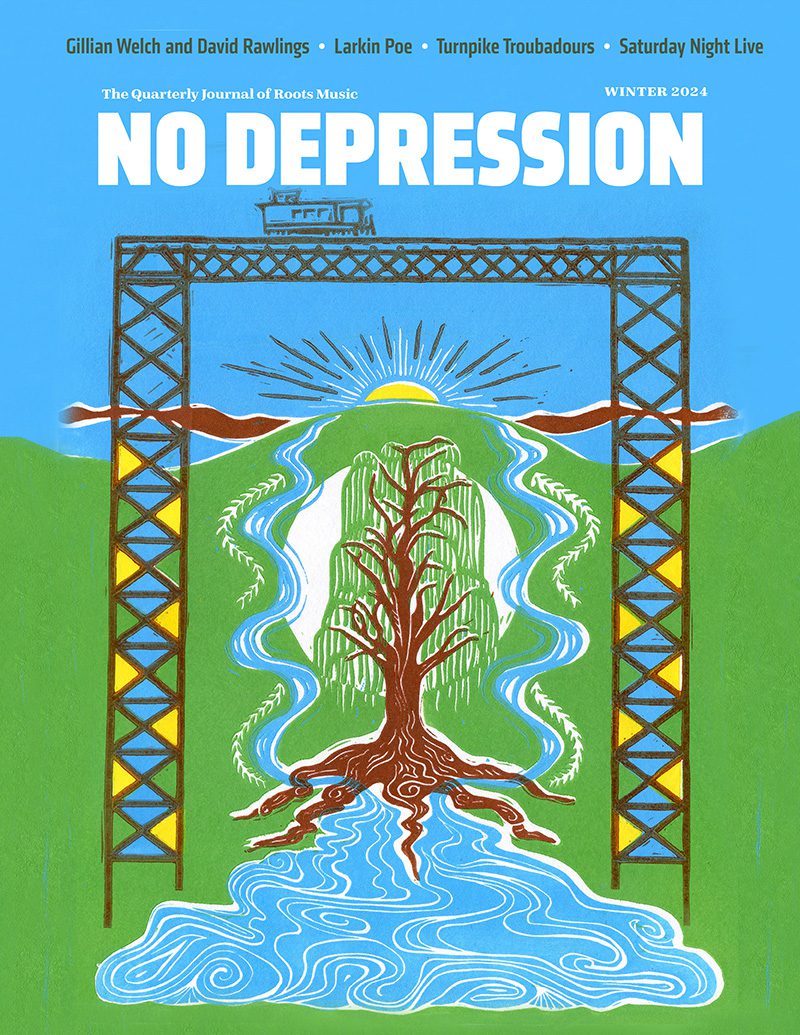WHAT ABOUT LOVE: Heart’s Ann & Nancy Wilson Talk To NPR’s Ann Powers
Beyond the obvious folk underpinnings to their often full-charged rock anthems and the blues-derived-from-the-Delta-by-way-of-the-UK, Heart’s Ann and Nancy Wilson theoretically have little to do with the worlds of alt-country, Americana, roots or whatever this No Depression world encompasses. Yet to hear the Sisters Wilson speak of the various aspects of becoming one of rock & roll’s pioneering female-fronted bands, the ground-breaking and evolution of creativity reflects much of what any oeuvre coming into its own faces.
There is, of course, the practical. How does titanic vocalist Ann Wilson maintain her vocal power and prowess? Beyond a lot of Vitamin C, she flatly offers, “Common horse sense: try to stay healthy and if you do Meet & Greets, use hand sanitizer.”
It’s not all that quippy, of course. The raven-haired singer stresses that she smokes nothing and doesn’t drink. At all. Ever.
“For some kinds of singing, loosening things up is okay, but when you’re coming at it… no.”
But more importantly, they – like Springsteen — stress the idea that authenticity is everything. When asked about the ‘80s, a time when marketing seemed to pitch their images to an extreme of sex’n’teased hair and the music reflected that overwrought theatre of carnality, they acknowledged the slickness, the layers of sounds and how processed it all became.
It was miles from Nancy’s evolution as a guitarist – based on playing acoustic guitar by herself and needing to fill in the musical needs through her playing. It became percussive for the ability to drive, to do what a rhythm section might – and her propensity for Telecasters stems from the beating they can take from her driving sense of rhythm.
What they didn’t talk much about was “being women in rock.” There was the XX versus XY-chromosone discussion – where they explained if men jump up and down, are full-tilt and crazy onstage, they’re rocking, while if women do the same thing they’re “bitches.”
They then spent a few moments explaining the ongoing impact the double standard has on music. Even acknowledging with an unusual candor just because you don’t have to take it today, that doesn’t make it any easier.
That thrust of truth over illusion adds strength to the arguments. They are not complaining, merely acknowledging and urging people, not just women, to persevere.
When the ‘80s came and left the bloat of corp/arena rock deflated, Ann and Nancy Wilson returned home to Seattle to sort out both how what had happened happened and to find musical solace and inspiration in the scene there: Alice in Chains, Pearl Jam, the bands emerging in the dawn of grunge becoming their new family.
Raising the issue of how much attention span does today’s audience have and lamenting the saturation of so much everything, they remained resolute that cutting through comes down to passion, focus and the willingness to seek something authentic.
“You can’t have somebody write your songs for you,” Ann cautioned. “It’s can’t be a hollow image thing. At the core, it has to be there – and you have to be willing to sacrifice so much.”
Though citing the camaraderie of the rock life of the 70s on the road, they both laugh about the lack of a proper template for the execution. Tales of mud fields and badly grounded mics, taking the money and running as an on-ramp to the life that comes post-champagne-toasting #1s “which can go for years…”
Still, for them. it is what was, not what lies ahead. Continuing to tour, to seek, to try to find musical current in the realm today’s music motivates the women who still tour aggressively, making music that shatters genres and reaches for something that feels true to the songs.
That vitality of creating today energizes them. Not content to be one more old old rock acts raking in the money on wave after wave of who we used to be, they play the songs they’ve created – and they keep reaching, knowing to rest on what was creates a stiffness that destroys.
“Heart is an ongoing, ever-changing progressive thing…,” says Ann of the dynamic. “Heart was a band before we joined it.”
As much as anything, NPR’s Ann Powers ran the session like three girls from Seattle sitting around talking. Littered with names of local bars, scenesters, and music teachers…this is what hearing a talk between three old friends who loved music would be like.
And the questions from the floor expanded the love fest to Olympian proportions, as people lined up, not to ask questions, but to profess gratitude for their willingness to show women could rock and still be feminine, to withstand the grind and especially to re-frame what was musically possible in terms of breaking down the walls between folk and hard rock, blues and pop.
Because of Heart, so many things were possible – and that was obvious by the awe and gratitude from the people approaching the mic. Whether the Austin, Texas, Girls Rock Camp director, the late middle aged man who’d interviewed the band in ’78 or the Latino musician who was quick to stress it’s not about being women, but being people who rock…this wildly commercial band impacted music lovers from a very core place – and that sense of empowerment reverberated all these years later.
As legacies go, Heart – who should be in the Rock & Roll Hall of Fame – has a deeper one than most. To touch people’s lives in a palpable way is the ultimate meaning for anyone’s band to manifest.




